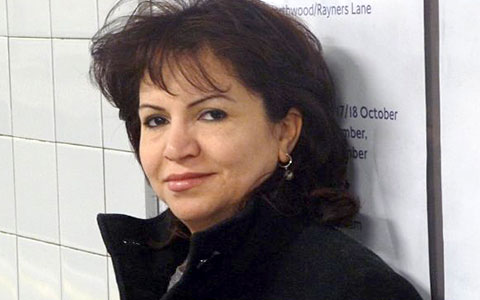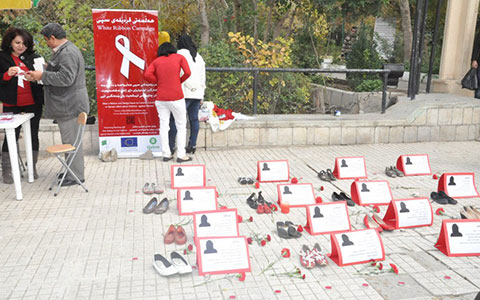Reform of Islam will save women’s lives, say White Ribbon Campaigners
by - 6th December 2012

Religious leaders are the key to ending violence against women in Iraq, according to a leading activist.
Khanim Latif, director of Asuda – a lobby group providing safe shelters for victims of gender-based violence - said the number of women in Iraq and Kurdistan suffering from domestic violence has increased since the invasion in 2003.
Women are being beaten up in their homes, experiencing rape, female genital mutilation and being kidnapped and trafficked for prostitution.
‘Wartime has definitely had an effect on this,’ Khanim said. ‘During and after times of conflict, women, girls and children are the victims.’
Khanim told Lapido that incidents such as last week’s beheading of a 15-year-old girl in Afghanistan after turning down a suitor were ‘normal’ in Iraqi-Kurdistan, where honour killings persist, despite condemnation from the authorities.
One in five women in Iraq aged between 15 and 49 has been the victim of physical violence by their husbands – and 14 per cent of these were pregnant at the time.
As part of the worldwide campaign to End Violence Against Women which ends on 10 December, Asuda has launched its White Ribbon Campaign in Kurdistan, engaging religious leaders, men and boys to combat the problem.
Men are encouraged to sign a pledge in which they agree not to commit violence against women and girls.

Asuda runs programmes of awareness-raising among Muslim leaders, educating them about the plight of the women who are forced to seek refuge after facing horrific attacks.
According to research by the Inter-Agency Information and Analysis Unit (IAIAU), 37 per cent of young Iraqi women and men said religion was a major factor which could help prevent violence against women, holding more sway than the media or education in potentially having an influence.
‘In this community, the majority is Muslim and they listen to their religious leaders so it is very important that we work with them,’ Khanim said.
‘But the success of our work with the religious leaders depends on the religious leaders themselves. There are a lot of religious leaders who don’t believe us.
‘For me, as a liberal woman, I believe that most of the violence and negative attitudes to women indirectly stems from Islam. I don’t want to cover my hair, but Islam tells me that I must. In front of a court, men and women are not equal. I want to be equal.
‘There is a lot of the violence which stems from Islam, but it is also the culture.’
In August 2011, the landmark Family Violence Law was implemented by the Kurdistan Regional Government and among its provisions were a series of measures to end female genital mutilation which is widespread in the region.
But the move was criticised by some, including local cleric Ismail Sussai who said FGM was ‘obligatory’. In a televised sermon he also said fathers should kill themselves if they lost their ‘honour’.
Khanim told Lapido: ‘Most of the religious leaders believe that FGM is instructed in Islam. Asuda has the responsibility to help solve this problem, which is why we think it’s important to work with religious leaders.’
President
The organisation and Khanim personally have come under attack for their work, and their partnership with international non-Muslim organisations.
‘All of the staff of Asuda know that this is very challenging work and we believe we have started some very difficult work and that we have to continue.’
She said that, despite landmark laws being implemented over the past year or so, there has so far been a lack of progress.
‘The political situation in Kurdistan is not stable and there is not the political will to do something.’
But last week, KRG prime minister Nechirvan Barzani pledged his commitment at a conference of the High Committee of the Campaign Combating Violence Against Women in Erbil, including condemning honour crimes, saying ‘there is no honour in murder'.
He said: ‘This campaign is not a show for the media; it is rooted in the belief of the Kurdistan liberation movement and the Kurdistan Regional Government in women’s rights. We know that violence against women is a serious threat to democracy. No system can call itself democratic unless it provides equality and justice.
‘I am sure that you agree with me that violence against women is a terrible expression of inequality and injustice. At the Kurdistan Regional Government, we are determined to protect women’s rights and promote equality of opportunity.’
In the meantime, Asuda will continue to provide shelter for the hundreds of women who become the victims of the abuse.
‘Sometimes, when the women come to us,’ Khanim said, ‘they just need somebody to listen to them. Sometimes they are little girls who were beaten for sending text messages. They are just babies. Every day, when I hear the women, when I listen to them, they give me the power to continue in what we’re doing.’
- Log in to post comments
